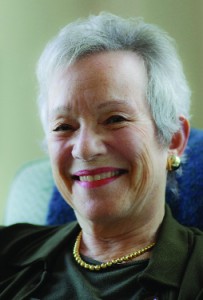Books
Personality
A Profile of Author Edith Pearlman
|
Hadassah Magazine
Getting your Trinity Audio player ready...
|

Edith Pearlman compares the Boston suburb that she calls home—Brookline, Massachusetts—to Paris. It has “many of the charms” of the French metropolis, she says, “but storekeepers don’t look down their noses at you and there is little crime.”
While the parallel is, perhaps, not obvious to most, one is not surprised to hear it from the septuagenarian author. Her stories deal with weighty ideas—exile and loyalty, the Jewish diaspora—through narratives about very ordinary individuals. However, the thoughtful writer clearly does not take herself too seriously.
Pearlman is the winner of the 2012 Harold U. Ribalow Prize, given annually to a work of fiction on a Jewish theme, for her highly acclaimed book Binocular Vision: New & Selected Stories (Lookout Books).
The author, originally from Providence, Rhode Island, sets many of her stories in the fictional New England town of Godolphin.
“On the map, Godolphin is exactly coincidental with Brookline,” she explains. “But I have altered it, added to it, distorted it, repeopled it, so that it no longer belongs to the citizens of Brookline, it belongs to me.”
In one story in the collection, “Girl in Blue with Brown Bag,” an elderly Godolphin man tutors a Russian teenager in American history. The man, Francis, tells his young protégée: “I identify with the Commonwealth. I see the Commonwealth as an extension of myself—its public gardens my flower patch, its public libraries my bookshelves, its police my bodyguard, its ball team my sandlot, its state hospitals my mad aunt.”
“About a year after that story came out,” Pearlman recalls, “I used Francis’s words in a Boston Globe op-ed about Brookline.” When a friend accused her of plagiarizing herself, her response was telling: “Francis speaks for me.”
Pearlman, a mother of two who says she had a limited conventional Jewish upbringing, had no previous connection to Hadassah, and was “both pleased and surprised to win [the Ribalow] Prize,” she says. She spent a year living in Jerusalem in the late 1990s. “I am interested in Jewish life in the diaspora and Jewish life in Israel,” she says. “I am proud and honored that my stories are considered good for the Jews.”
The author notes the many questions of identity that she grapples with as a so-called Jewish writer. “Am I a writer who writes on Jewish subjects or a Jewish writer who writes on many subjects?” she asks. “Am I a Jewish American Writer, a Jewish American Female Writer, a Jewish American Female Writer bred in New England and therefore part Yankee?”
 Pearlman has clearly given the subject plenty of thought. “The categories of writers concerned with Jewish subjects intersect and refine each other until they form a three-dimensional checkerboard,” she says. “Sooner or later every writer occupies his own cube. There’s a special one for the irreligious [Bernard] Malamud and his wondrous fables; for [J.D.] Salinger and his riotous imagination; one for I.B. Singer and one for I.J. [Singer].”
Pearlman has clearly given the subject plenty of thought. “The categories of writers concerned with Jewish subjects intersect and refine each other until they form a three-dimensional checkerboard,” she says. “Sooner or later every writer occupies his own cube. There’s a special one for the irreligious [Bernard] Malamud and his wondrous fables; for [J.D.] Salinger and his riotous imagination; one for I.B. Singer and one for I.J. [Singer].”
In addition to the Ribalow Prize, Binocular Vision won the 2011 National Book Critics Award for fiction, the Julia Ward Howe Prize, the Edward Lewis Wallant Award and was named ForeWord Book of the Year. Pearlman also received the 2011 PEN/Malamud Award for excellence in the art of short fiction.
Pearlman has published three previous story collections: Vaquita and Other Stories (Pitt Drue Heinz Lit Prize) (University of Pittsburgh Press), Love Among the Greats
(Eastern Washington University) and How to Fall: Stories
(Sarabande Books) as well as more than 250 stories in magazines and anthologies. (For more information about these works, go to www.edithpearlman.com.)
Pearlman says she is often asked why she writes short stories rather than novels. “My answers vary,” she admits. “Because I’ve never had an idea for a novel. Because I’m a miniaturist by nature. Because short stories give more freedom; because my mother told me not to take up too much of people’s time.” She notes that people do not ask why she writes short stories rather than poetry. “It seems to be understood that the compression of a poem—what is not said—distinguishes it from a short story in purpose and style,” she muses. “I would say something similar about the novel and the short story. The novel tells. The short story suggests. The poem secretes.”










 Facebook
Facebook Instagram
Instagram Twitter
Twitter
Leave a Reply